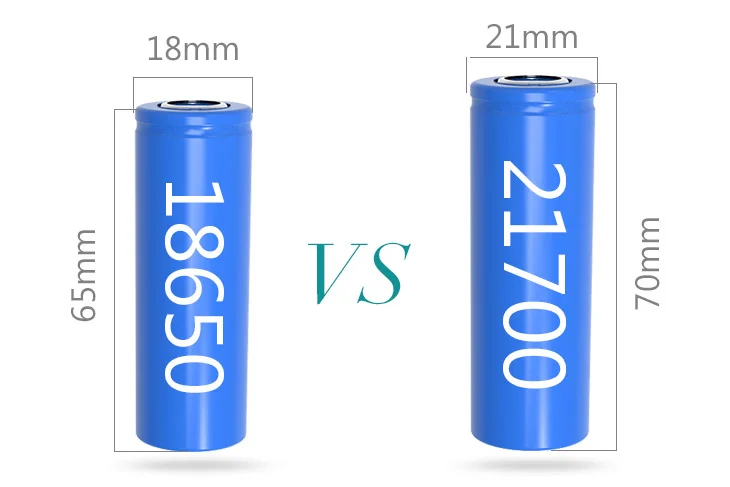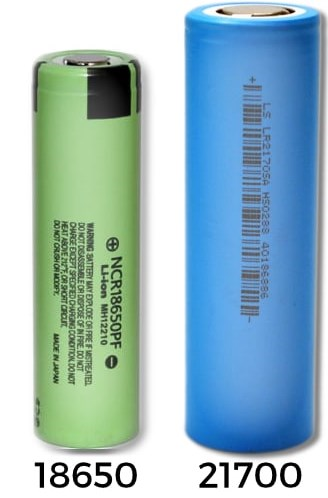21700 and 18650 batteries are types of lithium-ion batteries commonly used in a variety of electronic devices, including laptops, flashlights, electric vehicles, and cordless power tools.

-
18650 Battery: The 18650 battery is a cylindrical lithium-ion battery that is 18mm in diameter and 65.0mm long. It is a popular battery size known for its high energy density and long life cycle. These batteries typically have a capacity in the range of 1800mAh to 3500mAh.
-
21700 Battery: The 21700 battery is a larger cylindrical lithium-ion battery that is 21mm in diameter and 70.0mm long. Compared to the 18650, it offers higher capacity and potentially higher discharge rates. The 21700 batteries have gained popularity in certain applications due to their improved performance over the 18650 batteries.
Both 18650 and 21700 batteries have their own advantages and disadvantages, and the choice between them often depends on the specific requirements of the device in which they will be used.
21700 vs 18650 Battery: What Are the Differences between both Batteries

Here are some key differences between 21700 and 18650 batteries:
-
Size and Capacity:
- 18650: These batteries are 18mm in diameter and 65.0mm long, typically offering capacities ranging from 1800mAh to 3500mAh.
- 21700: These batteries are larger, with a diameter of 21mm and a length of 70.0mm. They generally have higher capacities compared to 18650 batteries, often ranging from 3000mAh to 5000mAh.
-
Performance:
- 21700: Due to their larger size, 21700 batteries can offer higher energy density and potentially higher discharge rates compared to 18650 batteries.
- 18650: While 18650 batteries are not as powerful or energy-dense as 21700 batteries, they are still widely used and can be more easily found in the market.
-
Compatibility:
- 18650: Since 18650 batteries have been around for a longer time and are more common, they are widely used in a variety of devices, from portable electronics to power tools.
- 21700: While 21700 batteries are becoming more popular, not all devices are designed to accommodate this larger size, so compatibility can be an issue depending on the device.
-
Voltage and Discharge Rate:
- 21700: 21700 batteries typically offer higher voltage and discharge rates compared to 18650 batteries, making them suitable for devices that require more power.
- 18650: While not as powerful as 21700 batteries, 18650 batteries still offer a good balance of capacity and power for many applications.
-
Heat Dissipation:
- 21700: The larger size of 21700 batteries can potentially help with heat dissipation during high-demand tasks, making them more suitable for high-performance applications.
- 18650: Smaller 18650 batteries may heat up more quickly under heavy loads, impacting performance over extended periods.
When choosing between 21700 and 18650 batteries, consider the specific requirements of your device in terms of size, capacity, power output, and compatibility. Each battery type has its advantages and is suitable for different applications.

Does 21700 Battery last longer than 18650
Typically, 21700 batteries do have the potential to last longer than 18650 batteries due to their larger size and higher capacity. Here are a few reasons why a 21700 battery may last longer than an 18650:
-
Higher Capacity: 21700 batteries generally have a higher capacity compared to 18650 batteries. This means that they can store more energy, allowing devices to run for a longer period before needing a recharge.
-
Energy Density: Due to advancements in battery technology, 21700 batteries often offer higher energy density than 18650 batteries. This means that they can provide more power for the same physical size, potentially leading to longer runtimes.
-
Improved Performance: 21700 batteries may have lower internal resistance and better discharge rates than 18650 batteries. This can translate to more efficient energy transfer and longer-lasting power delivery.
-
Longevity: While both battery types can degrade over time with use, 21700 batteries may have a longer cycle life than 18650 batteries. This means that they can withstand more charge and discharge cycles before experiencing significant capacity loss.
However, it's essential to consider that the actual lifespan of a battery depends on various factors such as usage patterns, charging practices, temperature conditions, and the specific device in which the battery is used. In practical terms, the perceived lifespan also depends on how well the battery is maintained and whether it is used within its specified operating parameters.
Ultimately, while 21700 batteries may have the potential to last longer than 18650 batteries under ideal conditions, the exact performance and longevity can vary based on the specific use case and how the battery is treated.

21700 vs 18650 Battery: Which One is better
The comparison between 21700 and 18650 batteries depends on the specific requirements of your use case. Each type has its own advantages and disadvantages, and the "better" option will vary based on factors such as capacity needs, power output requirements, device compatibility, and other considerations. Here are some key points to consider when choosing between 21700 and 18650 batteries:
Advantages of 21700 Batteries:
- Higher capacity: 21700 batteries typically offer higher capacities than 18650 batteries, providing more energy storage.
- Higher energy density: The higher energy density of 21700 batteries can result in longer runtimes and potentially more power output.
- Potential for higher discharge rates: 21700 batteries can often handle higher currents, making them suitable for devices that require more power.
- Longer cycle life: 21700 batteries may have a longer lifespan in terms of charge-discharge cycles.
Advantages of 18650 Batteries:
- Widespread compatibility: 18650 batteries are more commonly found and widely used in various devices, making them more accessible.
- Proven track record: 18650 batteries have been around for longer and are a mature technology with well-established performance characteristics.
- Compact size: 18650 batteries are smaller and can fit into a wider range of devices where space is limited.
- Cost-effective: 18650 batteries are often more affordable than 21700 batteries, which can be a consideration for some users.
In conclusion, the choice between 21700 and 18650 batteries depends on your specific needs. If you require higher capacity, longer runtimes, and potentially more power output, then 21700 batteries may be the better choice. However, if widespread compatibility, proven performance, compact size, or cost-effectiveness are more important factors for you, then 18650 batteries might be the better option. It's essential to assess your requirements and consider these factors when deciding which battery type is best suited for your particular application.



